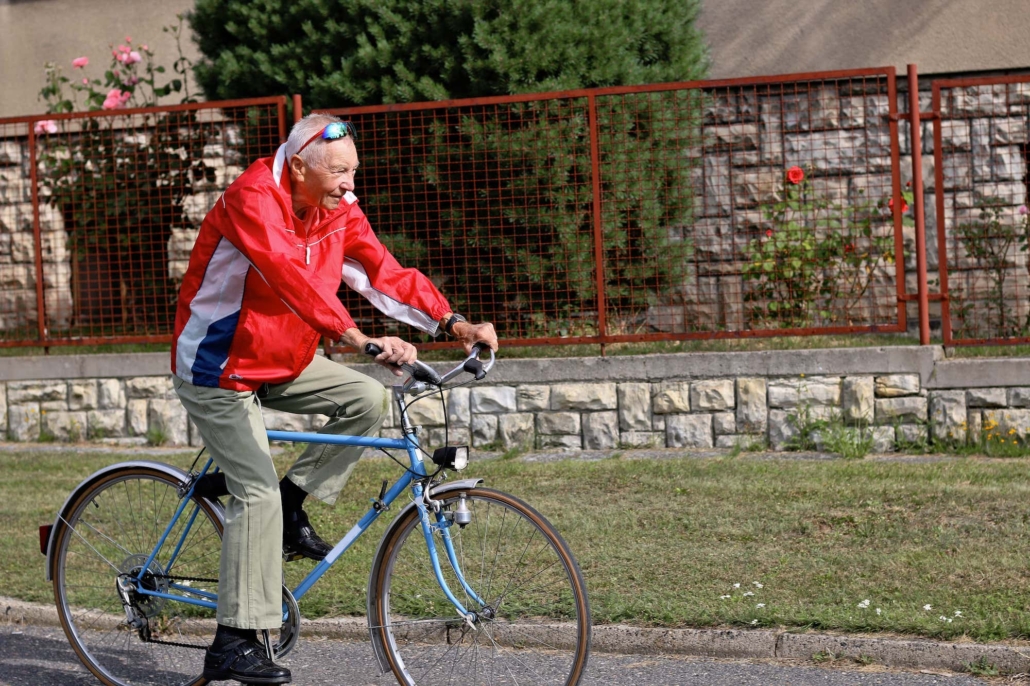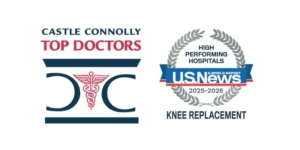Should I Get a Hip or Knee Replacement in my 80s or 90s?
No one of any age should live with pain and impaired mobility when there are good remedies available. If you’re in your 80s or 90s and experiencing significant hip or knee pain which is limiting your ability to remain active and happy, then a hip or knee replacement may be just as viable an option for you as for someone much younger. Hip and knee replacement surgeries are two of the most successful surgeries developed over the past century. Indeed, the growth in the number of people having a hip and knee replaced has been exponential, with a huge increase on the horizon for the coming years.
These surgeries are a remarkably predictable and powerful way to stop pain, helping people of all ages be more active, live more independent lives and smile again.
There are numerous reasons people in their 80s and 90s develop hip or knee symptoms severe enough to consider surgical correction. Osteoarthritis is the most common cause. With osteoarthritis, the cartilage that covers the ends of our bones breaks down and wears away. For the hip, this is the cartilage between the femoral head and socket. For the knee, it is the cartilage between the bottom of the femur bone and the top of the tibial bone or between the kneecap and femur. This results in bones grinding together when people move or walk, causing the joint to become inflamed and painful.
While it is true that not everyone in their 80s or 90s develops osteoarthritis, this condition is more common as we age. Osteoporosis, a progressive condition in which our bones become weak and brittle, also becomes more common and severe with age. This progressive condition can lead to a fracture, often with minimal trauma. It is extremely rare, however, that I encounter someone with such profound osteoporosis that I cannot perform a hip or knee replacement if needed. I often will choose a different prosthesis or method of fixing the prosthesis to the patient’s body in order to make the surgery safer and more dependable.
Not infrequently, patients seek a second opinion with me regarding a poor result after hip or knee surgery performed by another surgeon. I fully understand someone’s reluctance to consider even more surgery when the first failed, but many patients in this predicament can be helped immensely by redoing their surgery. It takes a leap of faith.
I have cared for many patients who delayed or ruled out surgery because they thought they were “too old” or were told their medical conditions prevented them from doing so. Age in itself is not a contraindication, but rather a consideration and an important variable that must be respected when caring for older patients. Older folks get well just as predictably as younger folks, although it often takes a little longer. Their post-operative pain relief is just as profound and their expressions of gratitude are truly heartfelt every time they tell me I have “given them back their lives.”
I see over and over the extraordinary impact of living pain-free again, whether that means driving, dancing or playing sports like golf, pickleball or tennis. Living independently, being social with family and friends and just not “feeling old” is huge!
Some older patients have been told they are not candidates because of their medical conditions. While it is true that there are people with medical conditions that preclude them from going forward with an “elective” hip or knee replacement, it is the exception rather than the rule. What I often find is that when their medical conditions are reassessed and any modifiable risk factors are addressed, such as better control of their diabetes or hypertension, cessation of smoking, or losing weight, the surgery can proceed safely.
Emergency Surgery and Impact on Outcomes
It is a different story when older people fall and break a hip or knee and emergency surgery is indicated. Elective hip or knee surgery is more predictable and often has a better outcome. It offers options for patients and their families, such as when and where the surgery should be scheduled and who the surgeon will be. Emergencies also eliminate the opportunity to mitigate various underlying conditions prior to surgery, such as anemia, poor nutrition or skin lesions and to strengthen specific muscles with exercises or physical therapy prior to surgery. Likewise, critical medical conditions such as those related to the heart, lungs, or circulation are stabilized
when the surgery is addressing a life-threatening emergency but often not optimized.
I routinely discuss with my older patients their options and share various strategies and philosophies. One approach is to wait as long as they can tolerate the pain and the reduced mobility before having the hip or knee replaced. Another perspective is that by performing the surgery sooner they will be younger, often healthier and suffering from less osteoporosis than if they wait. Also, it is easier and more predictable to correct an arthritic hip or knee problem “sooner rather than later”, when the condition is not as advanced or severe.
Power of Pain Management
Over the past several years, the most significant change I have seen in my practice is how much faster and more easily people get well than in the past. Patients are no longer asked to donate blood for their surgery, as blood loss has been reduced and transfusions are much less common. Anesthetic techniques have also greatly improved, with most of my patients getting a short-acting spinal anesthetic. This results in far fewer drugs given in lesser amounts, which is in the best interest of everyone, especially people who are older and who are more sensitive to drugs and more prone to postoperative confusion.
I think one of the major reasons my patients are getting well so much faster is that we’ve become so much better at preventing and decreasing pain by using multimodal pain management. Narcotics are given at a much lower dose along with an NSAID, Tylenol and other meds if necessary. Our surgical techniques are much more precise and predictable so our patients walk just hours after their surgery. This creates a wonderful psychological “can do” effect, even for patients in their 80s and 90s, because they are not in pain. It also greatly adds to safety. Hip replacement patients are no longer asked to avoid certain positions after their surgery and our incidence of hip dislocation is nearly zero.
Post-Operative Planning
Developing a post-operative plan is important for everyone and may be even more critical to have in place prior to surgery for patients who are in their 80s and 90s. Most of my older patients opt to stay overnight in the hospital after their surgery rather than go directly home the same day. Some, however, who have an excellent support system and are pain free and walking hours after their surgery opt to go home. Patients who are admitted typically go home a day or two later. Some patients are discharged to an inpatient rehab facility, although far less frequently than in years past. Every individual plan needs to be customized for the specific needs of that individual with the ultimate goal of becoming pain-free, active and independent.
The final decision to proceed or not with surgery is personal and takes into account many variables. We all have our individual fears and needs. Some patients share with me their strong aversion to feeling dependent on others, while others have a fear of falling and being vulnerable. Then there are those who struggle with feelings of isolation and even depression due to their diminished mobility. The decision to have surgery is personal and different for each of us, although I do try to dispel the myth that people in their 80s or 90s simply are too old. In most cases, the benefits of hip and knee surgery ultimately outweigh the risks of doing nothing and living in pain.
At the Leone Center for Orthopedic Care at Holy Cross Health, we provide superb, highly personalized, orthopedic care for people of all ages with hip and knee conditions. I offer patients the latest, most-promising innovations in joint replacement surgery in a compassionate, patient-focused setting, restoring their mobility and improving their quality of life.
The Leone Center for Orthopedic Care at Holy Cross Health is located at 1000 NE 56th Street in Fort Lauderdale. For more information or to schedule a consultation, please call 954-489-4575 or visit holycrossleonecenter.com.






